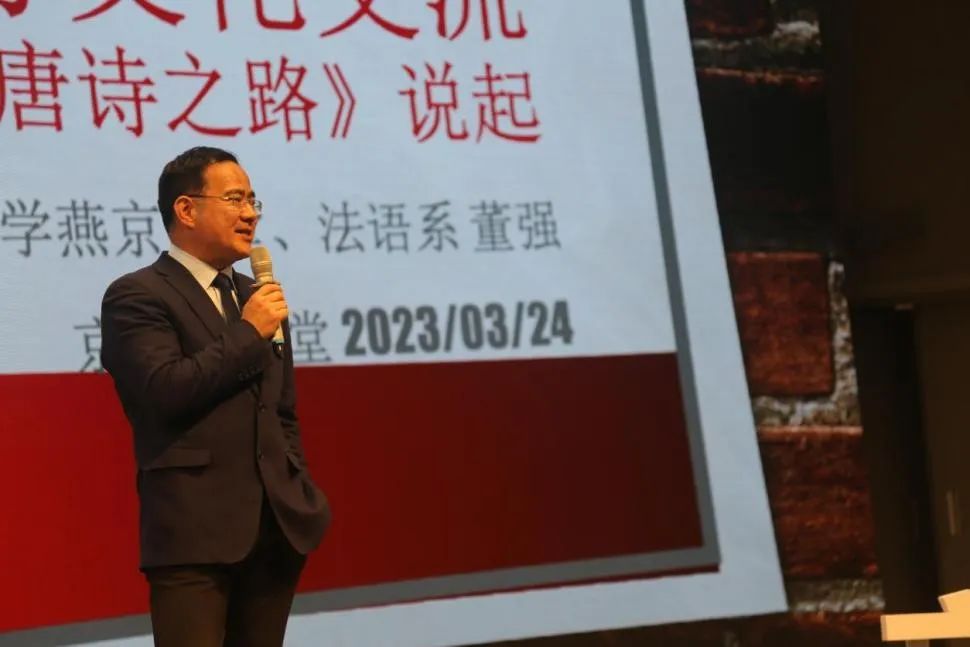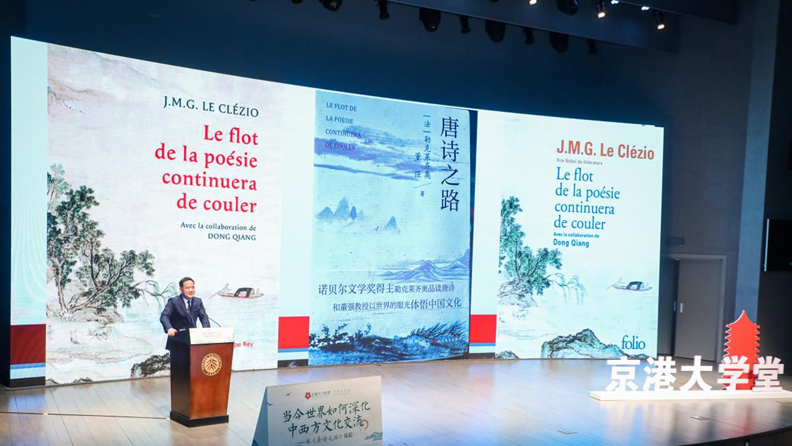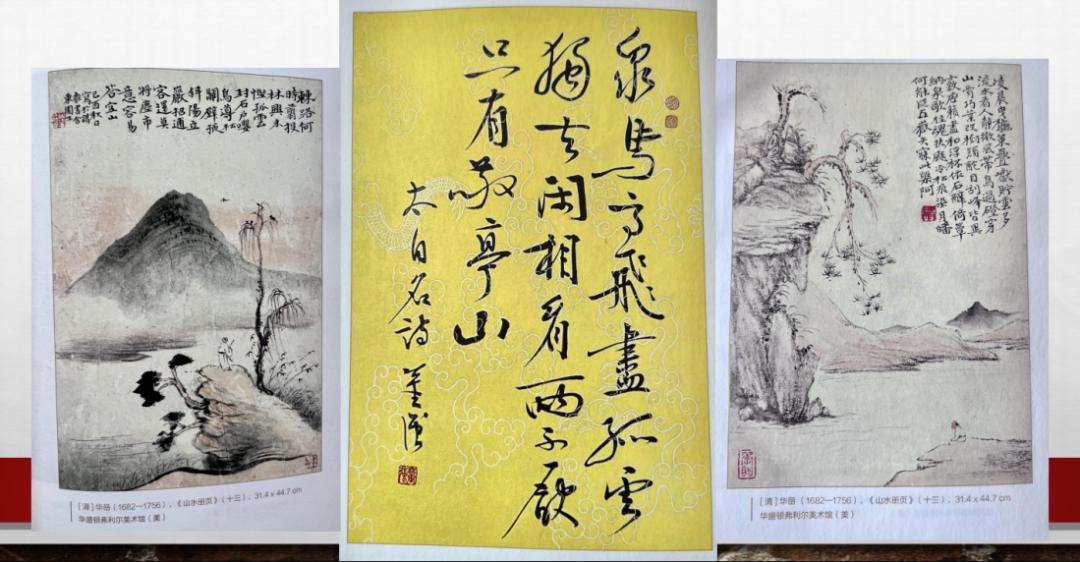On March 24, Professor Dong Qiang, Dean of Yenching Academy of Peking University, delivered a lecture to the BHUA Class, part of the Beijing-Hong Kong Universities Alliance. This event, simultaneously held online-offline, was organized by the PKU Office of Hong Kong, Macau, and Taiwan Affairs. During the lecture, Prof. Dong discussed the cultural exchange between China and the West. The lecture attracted nearly 200 teachers and students from various institutions who were present at the venue, including Beijing Normal University, Beihang University, Beijing Foreign Studies University, Beijing University of Technology, Beijing Institute of Technology, University of Chinese Academy of Sciences, Capital Medical University, Capital University of Economics and Business, and Peking University. Moreover, teachers and students from BHUA-affiliated universities in Hong Kong joined the event online.
Culture is undertaking homogenization and adopting an entertainment-oriented trend as the Internet and social media continue to gain prominence. Moreover, culture is vulnerable to nationalism nowadays; hence, safeguarding culture’s integrity is essential. Therefore, exploring new paths for China-West cultural exchange is imperative. Prof. Dong started his lecture with an introduction to the book Tang Shi Zhi Lu (The Road of Tang Poetry), offering insights into professional sinology, sinology of imagination, and how the West received and appreciated Tang poetry. His lecture shed light on fresh approaches to China-West cultural exchange.

Tang Shi Zhi Lu: A Path of Imagination
In 2022, Prof. Dong and Jean-Marie Gustave Le Clézio, the French winner of the Nobel Prize for Literature, published their co-authored work Le flot de la poésie continuera de couler (The River of Poetry Will Surge Forward), which was translated into Chinese by Prof. Dong as Tang Shi Zhi Lu (The Road of Tang Poetry). The two scholars made a new interpretation of Tang poetry from a global perspective. Their collaboration on this book is a testament to how Chinese and Western cultures meet and inspire new ideas and how long-lasting friendships are sustained across continents and cultures.
Prof. Dong found that cultural differences significantly influenced the translation of Tang poetry: An often-employed technique adopted when translating the Tang poems into Western languages is “addition” – adding specific contextual and temporal elements to the translation to ease understanding. To illustrate, the French poet Judith Gautier incorporated thoughts about distant countries he would go to and encounters with foreigners he would see when interpreting phrases like “looking up at the bright moon” and “drowning in homesickness”. Through such additions, the writer evoked sentiments of longing for “the friends I’d never see again.”

Prof. Dong showed illustrations in Tang Shi Zhi Lu to the audience. Most illustrations are selected from collections of galleries and museums outside China and aptly depict the mood and emotions the poems try to convey. For instance, Sitting Alone in Face of Peak Jingting goes with two paintings by the Qing painter Hua Yan, and the section depicting “the lotus-picking girl” is selected from a long scroll that accompanies Songs of the Southern Lass.
Such illustrations significantly help Western readers who can grasp the essence and emotions the Chinese poems contain instead of grappling with words. The illustrations may awaken Western readers’ awareness of their own cultures and arouse their imaginations and desire for a remote, strange civilization.

Professionals’ Sinology and Sinology of Imagination
Tang Shi Zhi Lu is not the only success. French academics have long had a liking for Chinese culture and strolled along the “Road of Tang Poetry” for centuries.
In addition to Judith Gautier, many other French poets and writers took an interest in China, recreating Tang poems to their imagination and interpretation of China and Tang poetry. They were representatives of the imaginative facets of Sinology in France, including Pierre Loti, Saint-John Perse, and Henri Michaux. Prof. Dong argued for a combination of professional Sinology and Sinology of imagination, as demonstrated in L’écriture poétique chinoise (The Writing of Chinese Poetry), authored by the Chinese-French scholar François Cheng.

Cheng took an approach of “faithfulness” and tried to put the original Chinese texts with their French translations on equal footing so that French readers accessed, for the first time, the Chinese language as it should be and could have a “wild imagination” of what the poems attempted to convey. Consequently, French readers and intellectuals grew interested in Tang poetry. Cheng’s efforts successfully combined professional Sinology and Sinology of imagination.
Generally, professional Sinology, as the name suggests, is often confined to academics. A Sinologist’s or scholar’s influence will likely wane after the person dies. However, the impact of Chinese culture and Sinology in French society and the West becomes more significant when intellectuals, writers, and common readers engage with these ideas.

A Promising Future of Cultural Communications
Prof. Dong concluded his lecture with Fletcher’s case.
Published in 1918, W.J.B. Fletcher’s Gems of Chinese Verse and More Gems of Chinese Verse impressed the English readership with his monographic translation of Tang poetry. Fletcher saw Tang poetry in an equal position to the greatest English poems, and with his works, Fletcher put forth an intertextuality between Tang poetry and English poems as well as in the world’s literature.
Dean Dong hoped that future academics could reinterpret Chinese literature from global perspectives beyond the framework of country study and incorporate Tang poetry into the history of the world’s literature.

Inspired by Prof. Dong’s lecture on cultural exchanges between China and the West and the professor’s personal experience, the students gained a better understanding of intercultural communications. The professor answered the students’ questions on the issue. He hoped that every student at the lecture would be an envoy of Chinese culture in their daily life.
Furthermore, he hoped that Peking University would maintain its status and role as a global institution, serving as a platform for spurring communication between China and the West. Such a platform would enable students, scholars, experts, and the public across the world to encounter and appreciate diverse cultures, including Chinese culture. Consequently, Peking University will play a pivotal role in propelling new waves of cultural exchanges between the East and the West.
